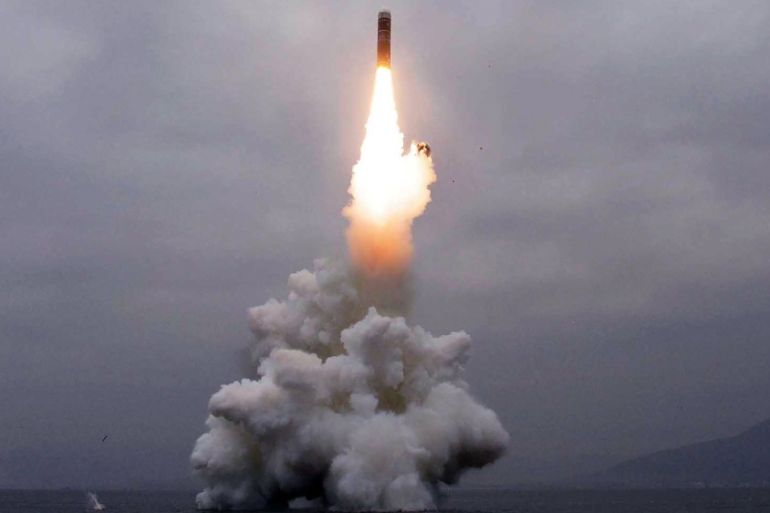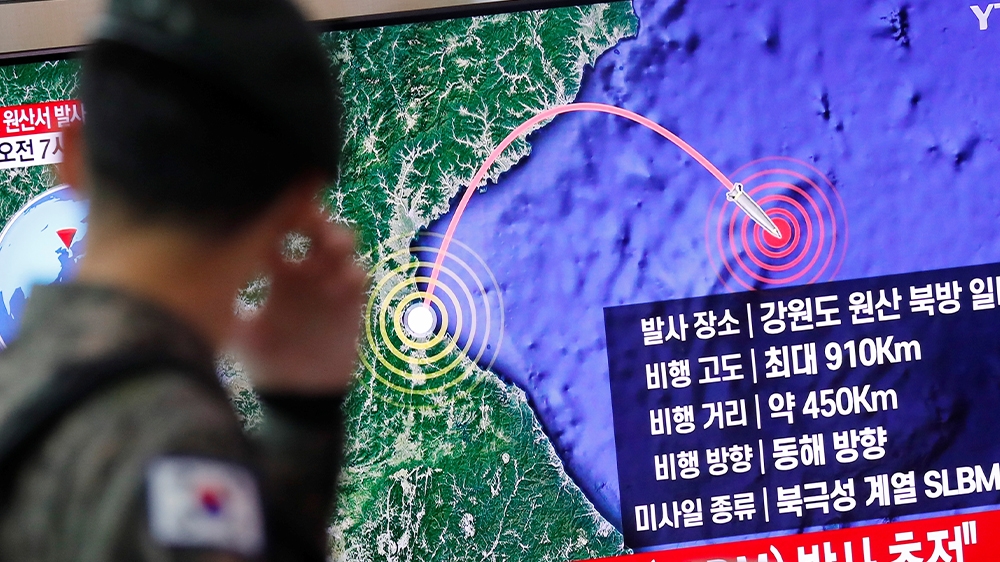N Korea says tested new submarine-launched ballistic missile
North’s leader Kim Jong Un did not attend launch, but sent message of ‘warm congratulations’ to scientists involved.

North Korea said on Thursday it had successfully test-fired a new submarine-launched ballistic missile (SLBM) which was necessary to contain external threats and enhance its self-defence, days before a new round of nuclear talks with the United States.
The launch on Wednesday was the most provocative by North Korea since it resumed dialogue with the US in 2018 and a reminder by Pyongyang of the weapons capability it had been aggressively developing, including intercontinental ballistic missiles, analysts said.
North Korean leader Kim Jong Un “sent warm congratulations” to the defence scientists who conducted the test, state news agency KCNA said, indicating he did not attend the launch as he had done previously at tests of new weapons systems.
The new type of SLBM called Pukguksong-3 was “fired in vertical mode” in the waters off the eastern city of Wonsan, KCNA said, confirming an assessment by South Korea’s military on Wednesday.
“The successful new-type SLBM test-firing comes to be of great significance as it ushered in a new phase in containing the outside forces’ threat to the DPRK and further bolstering its military muscle for self-defence,” the state news agency said. DPRK is short for the North’s official name, the Democratic People’s Republic of Korea.
The test “had no adverse impact on the security of neighbouring countries,” KCNA said but gave no further details.
Photos released in the North’s official Rodong Sinmun newspaper showed a black-and-white painted missile emerging and clearing the surface of the water, then the booster rocket igniting to propel it into the sky.

Kim absence ‘unusual’
A US State Department spokeswoman called on Pyongyang to “refrain from provocations” and to remain committed to the nuclear negotiations.
South Korea expressed strong concern and Japanese Prime Minister Shinzo Abe condemned the launch, saying it was a violation of UN Security Council resolutions.
North Korea rejects UN resolutions that ban it from using ballistic missile technology, saying they are an infringement of its right to self-defence.
Talks aimed at dismantling North Korea’s nuclear and missile programmes have been stalled since a second summit between Kim and US President Donald Trump in Vietnam in February broke down in disagreement over nuclear disarmament.
|
|
The Pukguksong-3 is thought to be a modification of an earlier version tested in 2015 to enhance its range, and was probably launched from a test platform rather than an actual submarine, said Kim Dong-yub, a military expert at Kyungnam University’s Institute of Far Eastern Studies in Seoul.
Leader Kim Jong Un’s absence was “extremely unusual,” Kyungnam University’s Kim said, and perhaps meant to contain the political fallout that could result in the upcoming talks falling apart before they even start.
On Wednesday, South Korea’s military said the missile flew 450km (280 miles) and reached an altitude of 910km (565 miles) and was probably a Pukguksong-class weapon.
South Korean Defence Minister Jeong Kyeong-doo said the Pukguksong, or Pole Star in Korean, would have had a range of about 1,300 km (910 miles) on a standard trajectory.
North Korea had been developing SLBM technology before it suspended long-range missile and nuclear tests and began talks with the US that led to the first summit between Kim and Trump in Singapore in June 2018.
The latest version of the Pukguksong may be the longest-range North Korean missile that uses solid fuel and the first nuclear-capable missile to be tested since November 2017, Ankit Panda of the US-based Federation of American Scientists said.
North Korea has been developing rocket engines that burn solid fuel, which has advantages in military use compared with liquid fuel because it is stable and versatile allowing it to be loaded in missiles until they are ready for launch.